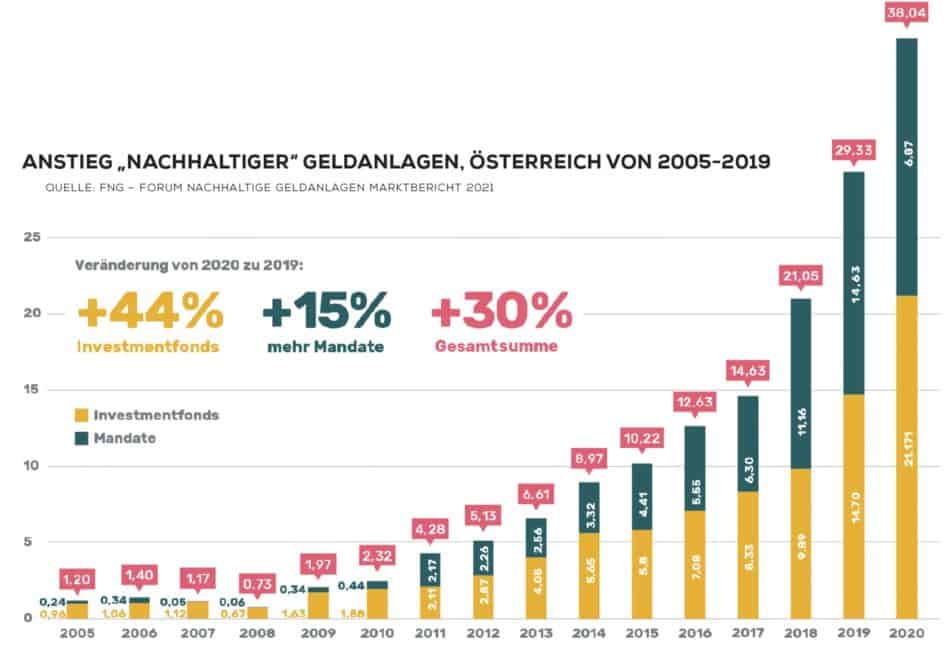Great commitments to climate protection can be heard from the financial sector and more and more green financial products are being advertised. Global 2000 tested banks for their actual sustainability for the first time.
"Green accounts can sometimes give the wrong impression and, despite existing regulations, can only be called that for marketing purposes," says Lisa Grasl, expert on sustainable finance at Global 2000. The bank check is intended to provide orientation for environmentally conscious consumers who do not want their money to be used to support environmentally harmful companies. Not the evaluation of individual products, but the banking business itself was the focus of this research. To this end, eleven banks were each confronted with 100 detailed questions.

Sustainable banks: Sobering results
The analysis is sobering: "Although banks use the environment to win the trust of climate-conscious consumers, they are waiting for legal obligations to actually convert their core business towards sustainability." According to Grasl, "The financial sector's newfound awareness of green issues is very welcome and an important step in the right direction, but it must not lead to green washing."
In the survey, only the environmental bank Raiffeisenbank Gunskirchen was able to exclude financing for companies in the field of fossil energies. All participating banks advertise with sustainability; for the most part, however, they continue to finance environmentally harmful sectors such as the fossil energy industry.
And that's not the only problematic area in which Sofas continue doing business while earning money in the booming market for green financial products. Cooperation deals in the arms industry, genetic engineering or gambling are still profitable. And: Current ratings sometimes classify oil companies as “sustainable”. This suggests that there are even worse industry representatives. This misleads those who use ranking results as a guide.
Photo / Video: Option.




Better to be biased than get planted? Am I in?
Just being biased and passing on untruths or half-truths is not fair and constructive either.
Sometimes I have the feeling that topics are simply used on their own to give the impression of a "Create a better future" concern.
My assumption: The accusation of "green washing" serves the purpose of simply putting on a "Create a better future" cloak.
-
Quick insight (I work in a bank) –
– The bank where I work – pushes the sustainability activities with massive costs/personnel expenses
– I admit that this is not only for altruistic reasons (they are not non-profit either), but also for economic reasons. After all, companies/banks are provided with an ESG rating and, as a result, cheaper refinancing is used.
– These rating classifications are created by rating agencies. I am now assuming that in a world-conspiratorial + biased manner these agencies are assessed as bought.
Well, it's probably worth doing some more in-depth research here. Feel free: The rating agency of the bank where I work is ISS rating agency. Google: "ESG rating: This is how the agency ISS ESG works (finance-magazin.de)"
Well, this article could of course also be bought/fake news.
The sustainability report is also audited by KPMG (a slightly larger accounting firm with $30 billion in revenue). (of course, this KPMG could also have been bought)
Regarding the specific accusation: Green washing in comparison to FY 2021 to FY 2020: It is simply impossible to peel sustainability out of the egg. It is not possible to end all customer relationships overnight because the company does not fit into the concept. (Mentioned industries such as arms industry, gambling have always been excluded anyway).
– The bank implements – in my case – the strategy by 2025 – and implements this consistently with great effort as follows:
- All employees are sensitized and trained in incredibly time-consuming and costly modules/e-learning and tests on the subject of ESG/sustainability.
(Costs around EUR 300,00 per person); Managers receive additional/profound training (costs in the 4-digit range per nose)
– CO2 emissions per employee have been reduced to less than one ton pa (no idea what this is worth in comparison or would have to be checked, but I think it’s not bad…)
– 50% of housing construction financing should be demonstrably sustainable (energy-efficient housing construction) by 2025. (Energy performance certificate is required)
– Doubling of investments in sustainable investments/funds by 2025 (companies according to ESG criteria)
– We have only been printing double-sided for 1 year. Account statements are only possible in digital form (and are therefore confronted with massive customer complaints)
– The bank aims to be carbon neutral by 2025
Etc etc.
We are on the right track and we continue to work to further increase our sustainability performance!
It is therefore allowed to recognize something positive and not just criticize it in Wutoma-style.
My prejudice: It has not been researched here with the necessary fairness. (For more on this, see the article “Negativity of the Media”).
Unfortunately, I can no longer take some organizations seriously.
I give back the accusation of instrumentalization 1:1.